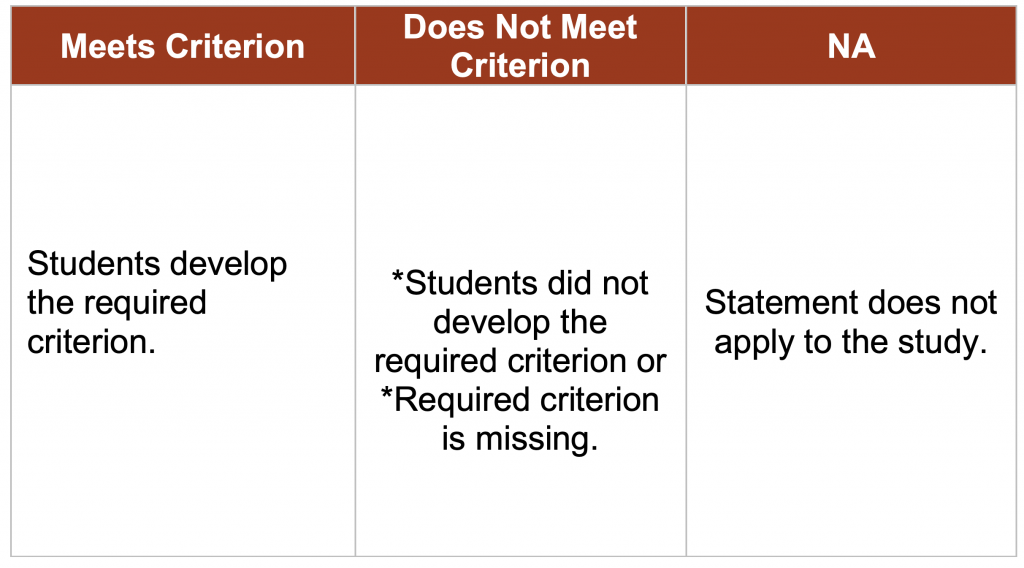Purpose
The new Dissertation Criteria Assessment (DCA) is a developmental and progression feedback tool that students, faculty members, and committees can use to monitor students in meeting dissertation assessment criteria throughout the Doctoral Journey Life Cycle and Dissertation Phases. For more on the Phases, please visit the Doctoral Journey tab on the College of Doctoral Studies Central: https://multimedia.phoenix.edu/doctoral-studies/
Doctoral ACCESS, content, and research courses use Program Student Learning Outcomes (PSLOs) to assess the degree to which students meet course objectives, while the DCA uses criteria to assess the degree to which students achieve dissertation designing, executing, and reporting on empirical social science research.
Approach and Outcome Descriptors
The DCA uses the following two metrics in which faculty assess students in achieving criteria:
- Meets Criterion: Students develop the required criterion.
- Does Not Meet Criterion: *Students did not develop the required criterion or *Required criterion is missing.
*When Faculty scores “Does Not Meet Criterion,” Faculty should provide clear qualitative feedback in the Tk20 textboxes on how students can meet the criterion.
Some statements may not apply to the study. In these cases, check N/A (not applicable).

Background
One of the most compelling aspects of conducting and analyzing original research projects is the prospect of contributing new information to the literature in a field. Whether these contributions are theoretical, empirical, methodological, or practical, these contributions may enhance the available meaning around concepts, aid future researchers in extending the boundaries of inquiry and knowledge and influence the lives of practitioners at all organizational levels and in daily life. However, as an effect of this requirement for novel approaches, research in all fields is difficult to assess from any perspective founded in standards and models, particularly dissertations. Traditionally, the dissertation has served as an evaluative marker of a doctoral candidate’s passage into a field of inquiry, but because dissertations take on numerous permutations and approaches, these evaluations have largely been the sole purview of one’s chair—an
individual typically possessing a wealth of knowledge about the field of study. Although this apprenticeship model has benefited doctoral learning since its inception, little information has been shared to describe how these evaluations are made, what criteria are brought to bear on the research, or how a chair’s approval translates to successful publication and the foundation of a larger research agenda. Lovitts (2007, 2006) described a growing need in doctoral education for explicit criteria students and faculty can use to improve research pedagogy, practice, and outcomes.
To address this need in doctoral education, the College of Doctoral Studies (CDS) developed a new comprehensive Dissertation Criteria Assessment (DCA) tool to assess the quality of dissertations at various Phases in their preparation. The DCA aligned with the Standards for Reporting on Empirical Social Science Research in American Educational Research Association Publications (American Educational Research Association, 2006), a document that details the elements of a quality research report as defined by the American Educational Research Association (AERA), the leading organization for educational research and one of the largest and most diverse research organizations in social science. These criteria provide a robust baseline for dissertations while enabling the flexibility needed to address the various methodologies and approaches used by dissertation writers. These criteria align with the publication standards of a prestigious external research organization; their application enhances students’ dissertations and contributes to the successful publication of dissertation related research.
References
American Educational Research Association. (2006). Standards for reporting on empirical social science research in AERA publications. Educational Researcher, 35(6), 33-40.
Lovitts, B. E. (2006). Making the implicit explicit: Faculty’s performance expectations for the dissertation. In P. L. Maki & N. A. Borkowski (Eds.). The assessment of doctoral education (pp. 163-187). Sterling, VA: Stylus.
Lovitts, B. E. (2007). Making the implicit explicit: Creating performance expectations for the dissertation. Sterling, VA: Stylus.
